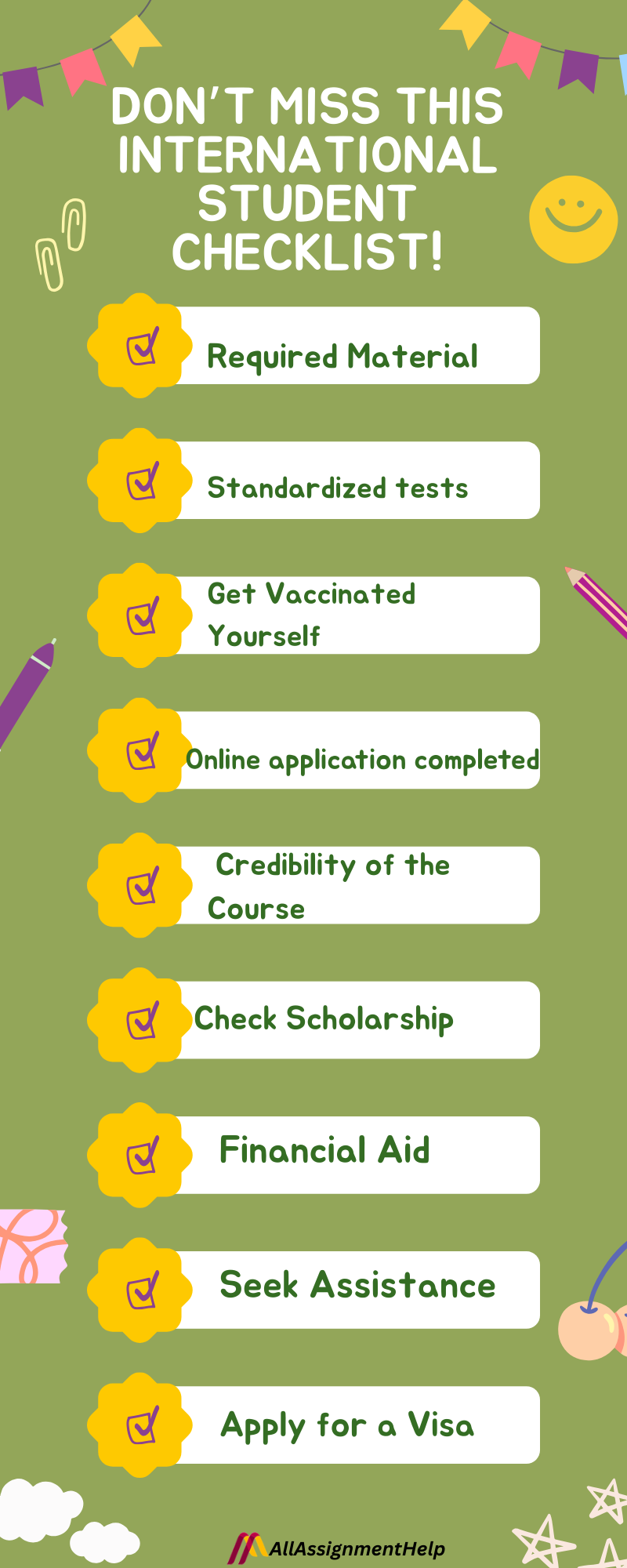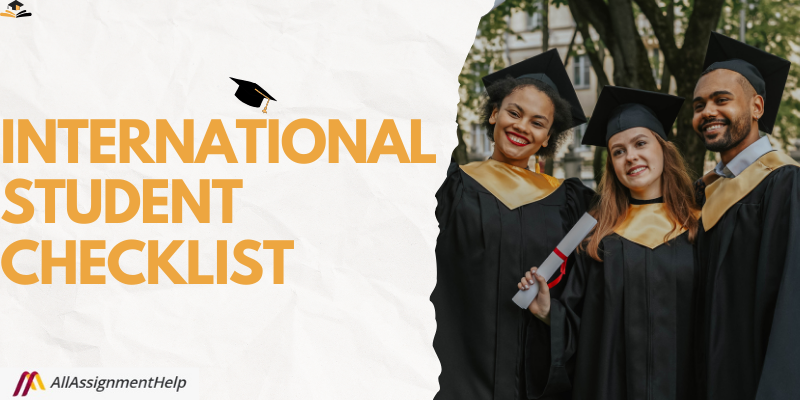Table of Contents
The opportunities for higher education in the United States are incredibly diverse. Regardless of your skills or goals, there is a degree that will be a perfect fit for you due to the abundance of learning options. However, when applying to American universities as an international student, there are several things you must be aware of and ready for.
You may already know which institutions you want to go to at this point. The next step is to find out which standardised tests are needed, how much it will cost to attend, and whether you qualify for any financial aid. That’s where this International Student Checklist comes in.
This blog by Allassignmenthelp lists the most crucial things to consider before applying to study in the United States, whether you’re just starting your research or getting ready to submit your applications.
Ready to Study in the USA? Don’t Miss This International Student Checklist!
It is a good idea to begin organising and preparing all of your academic records and other necessary documents to be sent to the selected colleges as soon as possible, as the entire admissions process takes approximately 18 months.

1. Required Material
- International applicants must meet the following requirements set forth by US universities:
- Online application completed
- Transcripts
- Copies of high school transcripts (which must be in English) are required for undergraduate admission.
- Undergraduate transcripts (official or formally notarized copies) are required for graduate admissions.
- For overseas students, a photocopy of a government-issued ID is required, while evidence of residency is required for undocumented students.
- Recommendation letters (two from coaches, employers, past teachers, etc.)
- Personal Essay
- Bank Statement (as evidence of sufficient funds)
- Evidence of proficiency in the English language, such as the BAU Placement Test, TOEFL, TOEIC, or IELTS
These are the basic requirements you need to compile and submit to the college where you wish to take admission. As you can see, US universities place a strong emphasis on English proficiency, so you must have a good command of the language and pass the necessary exams listed above. If you need support in improving your skills, especially in writing and comprehension, you can seek English assignment help to enhance your performance and boost your confidence.
Read More: Six Standard Approaches for Co-Teaching
2. Get Vaccinated Yourself
All nonimmigrant, non-U.S. persons, including international students, who travel to the United States by air must present proof of COVID-19 vaccination, according to current CDC standards. You must have gotten both doses in a two-dose series to fulfil these criteria.
Furthermore, a lot of American universities mandate that new students have had the recommended COVID-19 vaccinations.
Read More: Ways to Become an Expert in Professional Writing
3. Standardised tests
English language competence documentation is required of all applicants whose first language is not English. It usually requires overseas students to submit their TOEFL or IELTS exam results.
For postgraduate students, the Graduate Record Examination (GRE) or the Scholastic Aptitude Test (SAT) are further assessment of language proficiency.
Ideally, you should finish these tests a year before your desired start date at university. Universities usually have set minimum scores, so you have to achieve the score set by your selected university.
If you find it difficult to balance everything and your preparation for other academic subjects is being affected, you might consider seeking external help. In unforeseen situations, such as managing your online exams while preparing for the GRE, it can be nearly impossible for students to maintain the required pace. To overcome this, you can reach out to experts by asking online class help sites, Can you do my exam? And hire someone proficient enough to ensure you stay on track without compromising your overall academic performance.
4. Know the Education System of the US
Understanding how the American educational system works is important. It is designed to accommodate many degree levels, including associate’s, bachelor’s, master’s, and doctoral, and it gives you the freedom to customize your academic trajectory.
Before choosing a major, students are often able to take general education classes at U.S. institutions to investigate a variety of subjects. Credit-based programs allow students to mix majors and minors to fit their objectives. Other sorts of institutions include community colleges, private colleges, and public universities; each has its size, expense, and academic atmosphere.
Your international student checklist should include research on the kind of school that best suits your learning preferences and long-term objectives.
However, studying in US universities is not an easy job especially for abroad students. After getting admission, If you find yourself struggling to manage your coursework or adjusting to the U.S. academic system, don’t hesitate to take online class help from academic experts. These services can assist you with assignments, discussions, quizzes, and more, it can make it easier for you to stay on top of your studies while adapting to a new environment.
5. Confirm the Credibility of the Course
Verify that the university you are thinking about is certified and appropriately accredited. The institution’s national and international recognition and adherence to specific academic standards are guaranteed by accreditation. This is especially important because the Form I-20, which is necessary to secure an F-1 student visa, may only be issued by schools that have been approved by SEVP. Your visa application cannot be processed without this. Additionally, accreditation impacts your eligibility for post-graduation employment, graduate school, and credit transfer.
6. Know about financial eligibility
International students must present proof of their financial eligibility. While some schools may accept additional forms of proof to demonstrate financial eligibility, most require a copy of your bank account. American universities often provide two forms of funding: need-based financial aid and scholarships that recognise academic achievement.
7. Check Scholarship Programs
Scholarships can be acquired via a variety of methods, and most of them are now available online, provided you have the time and resources. It is dependent on the scholarship in terms of eligibility. Furthermore, most colleges provide international students with some form of financial help.
7. Financial Aid
International students are not eligible for loans, grants, or assistance with scholarships from the U.S. government. Although you are not eligible for U.S. federal help as an international student (i.e., the Free Application for Federal Student Aid, or FAFSA), the government of your home country may provide financial aid to students who wish to study overseas.
8. Seek Assistance and Services for International Students
Having the correct support network can make all the difference throughout the significant shift that is moving to a different nation. The assistance that universities provide to overseas students is essential in assisting them in adjusting to life in the United States.
Student assistance should be a top priority on your International Student Checklist while weighing your options. Academic and personal experiences can be significantly improved by a welcoming campus environment.
Moreover, as you settle into the academic routine, you may find it challenging to keep up with assignments, especially while adapting to a new education system. In such cases, accessing online assignment help can be a valuable resource. These services can provide guidance, editing, and tutoring support to ensure you stay on track with your coursework and meet academic expectations confidently.
9. Apply for a Visa
Getting your visa is the next step after being accepted to your preferred university. The sort of visa you need to apply for depends on your eligibility, major, and the kind of school you intend to attend. Three of the most popular visas obtained by overseas students are as follows:
- Student Visa for F1
- J1 Visitor Visa for Exchange
- M-1 Student Non-Academic Visa
10. Managing Exchange Rates
Before departing for the USA, choose to exchange currencies. When you first arrive, convert some of your country’s currency into US dollars to cover your early costs. It makes sense to have some USD on hand.
In addition to cash, think about using a Forex card that your loan provider has provided. It works like a debit card for several transactions and is a safe and practical way to handle money overseas.
So, these things should be included in the checklist for international students. It’s important to complete all the necessary preparations well in advance before going to study abroad. If your checklist is well-prepared and everything is checked off beforehand, your transition will be much smoother and less stressful.
However, if you feel the pressure is high while studying abroad and don’t match with the high competition, as there are multi-talented students who come from different backgrounds, then don’t panic. Just relax and get help with your academics by hiring professional writing experts available at online class help sites. Hiring these professionals and getting assistance for academic tasks can ease your learning and smooth your academic journey. For example, if you feel the need for assistance with your math writing task, don’t waste your time and get math assignment help from a reputable assignment writing website to submit a well-composed assignment with the support of experts.
Read More: Gothic Literature: Characteristics, Features, and Key Elements
Conclusion
It is our aim that this checklist for international students will help you get ready for the challenges that lie ahead as you move forward in the United States! The United States is home to half of the world’s best universities and colleges, and it has the most universities and colleges of any country. US institutions are renowned for their excellent networking possibilities, world-class education, and general inclusivity and flexibility. So, go and pack your bags and review your checklist before heading and grab the opportunities.
FAQs
1. What exams do I need to take to study in the U.S.?
TOEFL or IELTS for English proficiency; GRE, GMAT, or SAT/ACT depending on your program.
2. Can I work while studying in the U.S.?
Yes, international students on F-1 visas can work up to 20 hours/week on campus during the semester.
3. What kind of visa do I need?
You typically need an F-1 Student Visa for academic studies in the U.S.
4. How can I finance my studies?
Through scholarships, grants, part-time jobs, or financial aid offered by universities.
